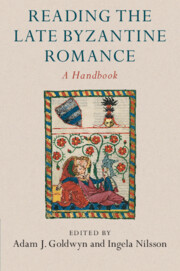Book contents
- Reading the Late Byzantine Romance
- Reading the Late Byzantine Romance
- Copyright page
- Contents
- Notes on Contributors
- Acknowledgements
- Note on the Late Byzantine Romances and Their Editions
- Chapter 1 An Introduction to the Palaiologan Romance
- Chapter 2 The Categories of ‘Originals’ and ‘Adaptations’ in Late Byzantine Romance
- Chapter 3 Intercultural Encounters in the Late Byzantine Vernacular Romance
- Chapter 4 Dreams and Female Initiation in Livistros and Rhodamne and Hypnerotomachia Poliphili
- Chapter 5 The Acculturation of the French Romance Pierre de Provence et la belle Maguelonne in the Byzantine Imperios and Margarona
- Chapter 6 Chronotopes between East and West in Apollonios of Tyre
- Chapter 7 Linguistic Contacts in the Late Byzantine Romances
- Chapter 8 From Herakles to Erkoulios, or the Place of the War of Troy in the Late Byzantine Romance Movement
- Chapter 9 Troy in Byzantine Romances
- Chapter 10 Herodotean Material in a Late Version of the Alexander Romance
- Chapter 11 The Palaiologan Hagiographies
- Chapter 12 Homosocial Desire in the War of Troy
- Chapter 13 Literary Landscapes in the Palaiologan Romances
- Chapter 14 The Affective Community of Romance
- Chapter 15 The Bookseller’s Parrot
- Index
- References
Chapter 12 - Homosocial Desire in the War of Troy
Between (Wo)men
Published online by Cambridge University Press: 17 December 2018
- Reading the Late Byzantine Romance
- Reading the Late Byzantine Romance
- Copyright page
- Contents
- Notes on Contributors
- Acknowledgements
- Note on the Late Byzantine Romances and Their Editions
- Chapter 1 An Introduction to the Palaiologan Romance
- Chapter 2 The Categories of ‘Originals’ and ‘Adaptations’ in Late Byzantine Romance
- Chapter 3 Intercultural Encounters in the Late Byzantine Vernacular Romance
- Chapter 4 Dreams and Female Initiation in Livistros and Rhodamne and Hypnerotomachia Poliphili
- Chapter 5 The Acculturation of the French Romance Pierre de Provence et la belle Maguelonne in the Byzantine Imperios and Margarona
- Chapter 6 Chronotopes between East and West in Apollonios of Tyre
- Chapter 7 Linguistic Contacts in the Late Byzantine Romances
- Chapter 8 From Herakles to Erkoulios, or the Place of the War of Troy in the Late Byzantine Romance Movement
- Chapter 9 Troy in Byzantine Romances
- Chapter 10 Herodotean Material in a Late Version of the Alexander Romance
- Chapter 11 The Palaiologan Hagiographies
- Chapter 12 Homosocial Desire in the War of Troy
- Chapter 13 Literary Landscapes in the Palaiologan Romances
- Chapter 14 The Affective Community of Romance
- Chapter 15 The Bookseller’s Parrot
- Index
- References
Summary
- Type
- Chapter
- Information
- Reading the Late Byzantine RomanceA Handbook, pp. 254 - 271Publisher: Cambridge University PressPrint publication year: 2018
References
Primary Sources
Secondary Sources
- 2
- Cited by

